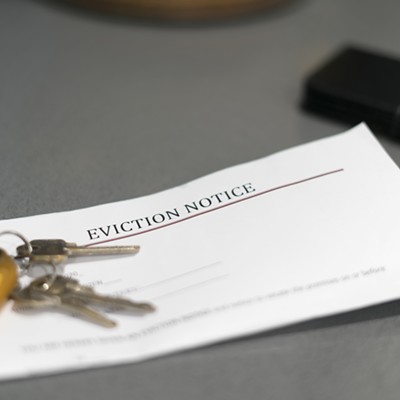Calling it a "horrible" and "really repressive" idea, Randall Smith, tenant organizer for the Southern Arizona People's Law Center, proposes the city broaden its horizons instead. "They should start at the top with George W. Bush and his daughters' criminal records," Smith says, "because they are living in federally subsidized housing."
Paul Gattone, attorney for the center, calls it disturbing to have criminal background checks run on people seeking housing assistance. "This is part of an anti-poor people trend. It certainly isn't surprising [that the requirement] came from Congress," he says.
The city is still in the process of finalizing details for checking the criminal backgrounds of the thousands of adults now on its Section 8 waiting list. Peggy Morales, program administrator for the city, hopes the Tucson Police Department will begin conducting checks by the end of August for groups of 200 or so applicants at a time.
Criminal background checks have been conducted on people applying for conventional public housing units for some time. This is a new effort for the Section 8 program, which provides vouchers that households can use to lease privately owned rental units.
Morales is now working to develop procedures for how Section 8 applicants or other adults in the household who have criminal records will be treated. A draft proposal lists numerous categories for denying housing assistance, but does provide some flexibility in dealing with individual cases. The only two certainties, according to Morales, are those who are registered sex offenders or who have been convicted of manufacturing methamphetamines will be barred from Section 8 assistance for life.
Other than that, the draft rules include denying assistance to those who are illegally using or possessing drugs or someone who "abuses alcohol in a way that may interfere with the health, safety, or right to peaceful enjoyment of the premises by other residents." People may also be excluded if anyone in the household has been arrested for a felony crime within the past three years or they have "engaged in or threatened abusive or violent behavior" towards housing staff or others.
Local consumer advocate Willy Bils has several problems with the new procedure. First, he says, Social Security numbers were collected improperly since the application form didn't meet federal standards. Bils points out that applicants are supposed to be told whether the provision of their SSN is mandatory or voluntary and what use will be made of the number. With that information, Bils says, people can make an informed and intelligent decision about whether they want to supply the number or not.
In this case, no SSN warnings were given, but Morales promises they will be at the time of applicant interviews. Bils believes this misstep reflects badly on the department, especially since the City Council two years ago directed that all local government forms were to comply with SSN legal requirements. Section 8 applicants "are entitled to the same protections under the law as anybody else," he says.
Morales agrees her agency could have done a better job. She indicates the next time applications are solicited the form will either not request an SSN or it will have the disclaimer warning included. "We want to comply with the law," she says.
Bils opposes the Tucson Police Department conducting the criminal background checks. "Do I want a paramilitary organization that has a great incentive to use the information from the application form for other purposes such as profiling individuals in order to get search warrants [conducting the background checks]?" he asks. He prefers the state's Department of Public Safety conduct the checks because it is further separated from the applicants.
The potential use of the information provided to the police is also controversial. While federal regulations tightly control what the city's housing department does with the criminal record material, no such standards exist for the reviewing law enforcement agency.
Morales says that talks with the police department haven't gotten to the point of discussing what it will do with the data collected. But, she believes, it is an issue that should be considered. "The information could be destroyed after being used," she says. "It's a good point and I will work toward doing that."
Bils asserts that unless that is accomplished, the application information will surely be retained because "it provides the police a peek into households. It's just a handy way to create databases, especially since poor people can't complain [if they need housing]."
The city's Section 8 screening process could help create a "cradle to grave big-brother-view of peoples' lives," Bils says. "That's frightening."












